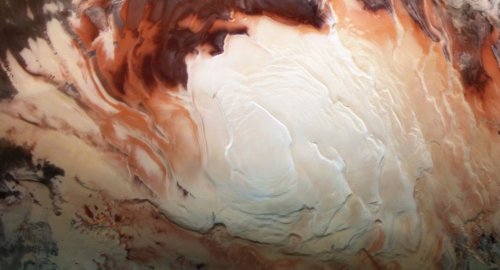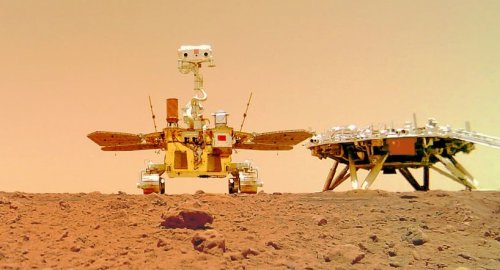
Dozens of lakes may be beneath Mars South Pole

- 28-06-2021, 18:51
INA – Sources
Much more liquid water may lie beneath the south pole of Mars than scientists had thought — or there may be something going on down there that they don't fully understand.
In 2018, researchers analyzing radar data gathered by Europe's Mars Express spacecraft announced they'd found evidence of a big subsurface lake in the Red Planet's south polar region.
The lake appears to be about 12 miles (19 kilometers) wide, and it lies about 1 mile (1.6 km) beneath the dry, frigid surface, the scientists reported.
The same core research team soon followed up on the find, using the same Mars Express instrument — Mars Advanced Radar for Subsurface and Ionospheric Sounding, or MARSIS for short — to study the subsurface in a wide area around the apparent lake.
This work turned up evidence for three more underground lakes, each of them about 6 miles (10 km) wide, the scientists reported in a study last year.
Now, a different team has taken a very deep dive into the data. Arizona State University doctoral student Aditya Khuller and MARSIS co-principal investigator Jeffrey Plaut, of NASA's Jet Propulsion Laboratory (JPL) in Southern California, analyzed 44,000 observations MARSIS made of the Martian south polar region over 15 years.
The duo found dozens of radar reflections similar to the four that have been interpreted as buried lakes, over a wide range of horizontal and vertical distances. But many of the newfound signals were spotted relatively close to the surface, in places seemingly too cold to support liquid water — even the briny stuff hypothesized to exist in the Martian underground.
"We’re not certain whether these signals are liquid water or not, but they appear to be much more widespread than what the original paper found," Plaut said in a statement.
"Either liquid water is common beneath Mars’ south pole, or these signals are indicative of something else."
It's unclear what could keep so many relatively shallow lakes — if the newfound signals do indeed indicate lakes — from freezing over on frigid Mars. Volcanism is one possibility that researchers have raised, said Khuller, who conducted the new research while an intern at JPL.
Severe storm causes landslides, widespread flooding in Italy
- International
- 11:41
Duhok of Iraq and Qadsia of Kuwait match kicks off
- Sport
- 25/04/15
Four Daesh terrorists detained in Salahuddin
- Security
- 25/04/14
Two ISIS hideouts destroyed, killing those inside in Salah al-Din
- Security
- 25/04/13
Date Set for 'El Clasico' Final of the Copa del Rey
- Sport
- 25/04/12












